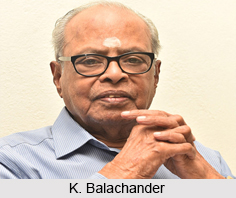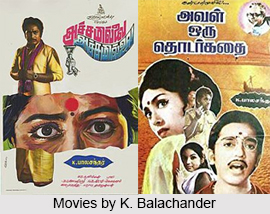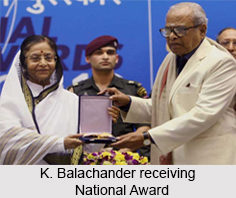 K. Balachander was a highly revered Indian film personality, whose directorial and production works are especially in the Tamil Cinema. He had his unique style of film-making, in which he diligently incorporated unconventional themes, contemporary subject matters, complicated interpersonal relationships and socially relevant themes. He has left his mark in the film industry with an illustrious range of films, not only restricted to Tamil cinema but also in Kannada, Telugu and Hindi cinemas. He is referred to as "Iyakunar Sigaram", which means "the director who scaled the peak" in Tamil. He had mentored some prominent figures of Indian cinema like; Kamal Hassan, Rajnikanth and Prakash Raj.
K. Balachander was a highly revered Indian film personality, whose directorial and production works are especially in the Tamil Cinema. He had his unique style of film-making, in which he diligently incorporated unconventional themes, contemporary subject matters, complicated interpersonal relationships and socially relevant themes. He has left his mark in the film industry with an illustrious range of films, not only restricted to Tamil cinema but also in Kannada, Telugu and Hindi cinemas. He is referred to as "Iyakunar Sigaram", which means "the director who scaled the peak" in Tamil. He had mentored some prominent figures of Indian cinema like; Kamal Hassan, Rajnikanth and Prakash Raj.
Early Life of K. Balachander
K. Balachander or Kailasam Balachander was born on July 9, 1930 into a Tamil household, in the Tiruvarur district of Tamil Nadu. His earliest interest in cinema grew in his very childhood watching films of M. K. Thyagaraja Bhagavathar, the then Superstar in Tamil films. He was driven towards theatre and drama while growing up, and developed interest in acting, writing and directing amateur plays by engaging in the same. While pursuing his graduation from Annamalai University, he continued to revel in his passion of theatre. He later joined an amateur drama company after working in different jobs for some time and soon formed his own troupe. He wrote "Major Chandrakanth", a play in English that he rewrote in Tamil, after which it became a sensation among people. He gained prominence as an amateur playwright with this play. He produced and directed several critically appreciated plays.
 Film Career of K. Balachander
Film Career of K. Balachander
Starting out as an enthusiastic playwright and stage director, K. Balachander went on to write and direct almost 100 films, while also producing and acting in some. Two of his plays "Server Sundaram" and "Major Chandrakanth" were adapted into a Tamil and a Hindi film respectively, and both the films were recognised with accolades.
K. Balachander made his directorial debut in "Neerkumizhi" in 1965, based on his own play of the same name, with actors from his own troupe. He made other plays of his own into Tamil films, one of which is "Major Chandrakanth" had Jayalalitha, the actor-turned-politician playing the lead heroine. In 1967, he wrote and directed "Barna Vijayam", a comedy family drama with an ensemble cast. It was very successful and he remade it in Telugu. The success of both the versions drove the Hindi remake of the same titled "Teen Bahuraniyan". His another family drama was "Iru Kodugal" in 1969, starring Gemini Ganesan.
In the 1970s, K. Balachander made several unconventional off-beat films with feminism and womanhood as the driven plot, portraying women as bold personalities and central characters. He re-entered Bollywood with "Ek Duuje Ke Liye" adapting his successful Telugu original, in 1981. It earned critical acclaim and major success at box office, also winning Filmfare Award for Best Screenplay. His later years" films included his 100th film project "Parthale Paravasam" in 2001 and "Poi" in 2006.
Television Career of K. Balachander
K. Balachander also ventured into television with serials like "Kadhal Pagadai", "Premi" and several others, most of which again focussed on women as his early films. He also returned to theatre after 40 years with a play "Pournami".
Filmography of K. Balachander
The following are the filmography of K. Balachander:
| 1964 |
Dheiva Thaai |
Tamil |
1978 |
Nizhal Nijamagiradhu |
Tamil |
|
Server Sundaram |
Tamil |
|
Maro Charithra |
Telugu |
| 1965 |
Oonche Log |
Hindi |
|
Thappu Thalangal |
Tamil |
|
Poojaikku Vandha Malar |
Tamil |
|
Thappida Thala |
Kannada |
|
Neerkumizhi |
Tamil |
|
Balapareekshanam |
Malayalam |
|
Neela Vanam |
Tamil |
1979 |
Ninaithale Inikkum |
Tamil |
|
Naanal |
Tamil |
|
Andamaina Anubhavam |
Telugu |
|
Major Chandrakanth |
Tamil |
|
Nool Veli |
Tamil |
| 1966 |
|
|
|
|
|
|
Urandhakallu Oesthu Naaru Jackraga |
Tamil |
|
Guppedu Manasu |
Telugu |
| 1967 |
Bama Vijayam |
Tamil |
|
Idi Katha Kaadu |
Telugu |
|
Anubavi Raja Anubavi |
Tamil |
|
Kazhagan |
Telugu |
| 1968 |
Ethir Neechal |
Tamil |
1980 |
Varumayin Niram Sivappu |
Tamil |
|
Thamarai Nenjam (film) |
Tamil |
1981 |
Aakali Rajyam |
Telugu |
|
Bhale Kodalu |
Telugu |
|
Adavaalu Meeku Joharulu |
Telugu |
|
Sukha Dukhaalu |
Telugu |
|
Enga Ooru Kannagi |
Tamil |
|
Teen Bahuraniyan |
Hindi |
|
Tholikodi Koosindi |
Telugu |
| 1969 |
Poova Thalaiya |
Tamil |
|
Thillu Mullu |
Tamil |
|
Sattekalapu Satteya |
Telugu |
|
Thaneer Thaneer |
Tamil |
|
Iru Kodugal |
Tamil |
|
Ek Duuje Ke Liye |
Hindi |
|
Chiranjeevi |
Telugu |
|
47 Natkal |
Tamil |
| 1970 |
Patham Pasali |
Tamil |
|
47 Rojulu |
Telugu |
|
Ethiroli |
Tamil |
1982 |
Agni Sakshi |
Tamil |
|
Navagraham |
Tamil |
|
Benkiyalli Aralida Hoovu |
Kannada |
|
Kaviya Thalaivi |
Tamil |
|
Poikkal Kudhirai |
Tamil |
|
Sambarala Rambabu |
Telugu |
|
Zara Si Zindagi |
Hindi |
|
Bheekara Nimishangal |
Malayalam |
1983 |
Kokilamma |
Telugu |
| 1971 |
Naangu Suvargal |
Tamil |
1984 |
Ek Nai Paheli |
Hindi |
|
Nootrukku Nooru |
Tamil |
|
Achamillai Achamillai |
Tamil |
|
Bomma Borusa |
Telugu |
|
Eradu Rekhegalu |
Kannada |
|
Moogabrama |
Telugu |
|
Kalyana Agathigal |
Tamil |
|
Punnagai |
Tamil |
|
Sindhu Bhairavi |
Tamil |
|
Lakhon Mein Ek |
Hindi |
1985 |
Mugila Mallige |
Kannada |
|
Main Sunder Hoon |
Hindi |
1986 |
Sundara Swapnagalu |
Kannada |
| 1972 |
Kanna Nalama |
Tamil |
|
Punnagai Mannan |
Tamil |
|
Velli Vizha |
Tamil |
1987 |
Manathil Uruthi Vendum |
Tamil |
|
Haar Jeet |
Hindi |
1988 |
Rudraveena |
Telugu |
|
Aaradimanninte Janmi |
Malayalam |
|
Unnal Mudiyum Thambi |
Tamil |
| 1973 |
Arangetram |
Tamil |
1989 |
Pudhu Pudhu Arthangal |
Tamil |
|
Sollathaan Ninaikkiren |
Tamil |
1990 |
Oru Veedu Iru Vasal |
Tamil |
| 1974 |
Aval Oru Thodar Kathai |
Tamil |
1991 |
Azhagan |
Tamil |
|
Naan Avanillai |
Tamil |
1992 |
Vaaname Ellai |
Tamil |
|
Jeevitha Rangam |
Telugu |
|
Dilon Ka Rishta |
Hindi |
| 1975 |
Apoorva Raagangal |
Tamil |
1993 |
Jathi Malli |
Tamil |
| 1976 |
Manmadha Leelai |
Tamil |
1994 |
Duet |
Tami
Awards and Achievements of K. Balachander
An innumerably awarded film personality, K. Balachander had won nine National Film Awards and 13 Filmfare Awards for his works. He was also conferred with the Padma Shri by the Government of India in 1987 and the Dadasaheb Phalke Award, India"s highest award in cinema. K. Balachander had won multiple awards in different categories, for his works in screenplay as writer, for direction and for films he produced. The varied list incorporates:
 9 National Film Awards including: 9 National Film Awards including:
Best Tamil Film for "Iru Kodugal" (1969), "Apoorva Raagangal" (1975),
"Thaneer Thaneer" (1981) and "Achamillai Achamillai" (1984).
Best Screenplay for "Thaneer Thaneer" (1981)
Dadasaheb Phalke Lifetime Achievement Award (2011)
Nargis Dutt Award for Best Feature Film on National Integration for "Rudraveena" (1988) and "Roja" (1992)
National Film Award for Best Film on Other Social Issues for "Oru Veedu Iru Vaasal" (1991)
He won a total of 13 Filmfare Awards including:
Best Screenplay for "Ek Duuje Ke Liye" (1981)
Best Tamil Director for "Aval Oru Thodar Kathai" (1974), "Apoorva Raagangal" (1975), "Varumayin Niram Sivappu" (1980), "Thaneer Thaneer" (1981), "Achamillai Achamillai" (1984), "Pudhu Pudhu Arthangal" (1989), "Vaaname Ellai" (1992) and "Maro Charitra" (1978).
Best Film (Tamil) for "Achamillai Achamillai"(1984), "Sindhu Bhairavi" (1985) and "Roja" (1992).
Lifetime Achievement Award in 1994
In addition to many other awards in writing and direction, K. Balachander was conferred with an honorary doctorate "Doctor of Letters" by Sathyabama University, Alagappa University and University of Madras. Also, he was honoured with the Lifetime Achievement Award at the 39th International Film Festival of India in 2008.
Personal Life of K. Balachander
K. Balachander tied the knot with wife Rajam in 1956. Together they raised sons Kailasam and Prasanna and daughter Pushpa Kandaswamy.
Death of K. Balachander
K. Balachander was hospitalised in December, 2014, following a neurosurgery in the previous month. Reported to have been suffering from
Share this Article:
More Articles in
Indian Movies
3D Films in India
3D films in India have gradually marked a prominent presence in the Indian film industry with the advancing technology. The movie Chota Chetan was the first 3D film of India which was followed many others in Hindi as well as regional film industries.
Filmfare Award for Best Music Director
Filmfare Award for Best Music Director is awarded to the music director who composes the most soulful and audience appealing music album for a Hindi film of the preceding year.
Filmfare Award for Best Female Debut
Filmfare Award for Best Female Debut is awarded to the debutante actress who gives the most impressive performance in her debut Hindi film and shows a promising presence in Bollywood.
Arundhati Devi
Arundhati Devi is considered as one of the most independent minded, educated and forceful women in the history of Bengali cinema who was a multidimensional talent from being a director to actress.
Filmfare Award For Best Actor
The Filmfare Award for Best Actor is presented by Filmfare every year to the actor who portrays his character and performs the role in a film with most commendable finesse.
Bollywood Villains
Bollywood villains have entertained the audience over years. Bollywood villains are only the villains on screen. Some notable Bollywood villains include Premnath, Omrish Puri, Shakti kapoor, Danny, Amzad Khan etc.
Marathi Actors
Marathi actors in India have made significant contributions to the country`s film industry, showcasing their exceptional talent, versatility, and dedication. From veteran legends to emerging stars, Marathi actors have left an indelible mark on Indian cinema, enriching it with their powerful performances and captivating storytelling.
Bengali Actors
Bengali actors have a significant contribution in the Bengali cinema and over years they have presented the film industry many landmark films which marked their spectacular performances. Their outstanding dramatic skills won them applauses from critics as well as masses.
Bengali Actresses
Bengali Actresses are the most beautiful, talented and evergreen of the whole Indian film industry. The incomparable acting ability has made them well-known to all.
Odia Cinema
Colloquially known as Ollywood, the industry of Odia Cinema is based in Cuttack and is a popular on the regional basis.
Tamil Actors
The Tamil actors with their powerhouse performance aided in shaping the Kollywood industry.
Filmfare Lifetime Achievement Award
Filmfare Lifetime Achievement Award is presented to honour the film personalities who have enriched the Hindi film industry with their profound contribution over the years.
Telugu Cinema
Telugu cinema, also known as Tollywood, is the segment of Indian cinema dedicated to the production of motion pictures in the Telugu language, widely spoken in the states of Andhra Pradesh and Telangana.
Gujarati Movie Actors
Gujarati movie actors, like Upendra Trivedi, Arvind Rathod etc, are talented entertainers who have significantly contributed to the development of Gujarati film industry.
Bengali Cinema
Bengali Cinema has proved itself class apart instead of being a regional film industry. It has its own charm and attraction which is enough to make it popular.
Assamese Film Actresses
Assamese Film Actresses have carved a niche for themselves in the history of regional films. They are talented and credible with susceptible style. They have contributed to the growth of Assamese cinema in all the ways possible.
Tamil Actresses
A talented lot of Tamil Actresses has enriched Tamil cinema for years.
|
 K. Balachander was a highly revered Indian film personality, whose directorial and production works are especially in the Tamil Cinema. He had his unique style of film-making, in which he diligently incorporated unconventional themes, contemporary subject matters, complicated interpersonal relationships and socially relevant themes. He has left his mark in the film industry with an illustrious range of films, not only restricted to Tamil cinema but also in Kannada, Telugu and Hindi cinemas. He is referred to as "Iyakunar Sigaram", which means "the director who scaled the peak" in Tamil. He had mentored some prominent figures of Indian cinema like; Kamal Hassan, Rajnikanth and Prakash Raj.
K. Balachander was a highly revered Indian film personality, whose directorial and production works are especially in the Tamil Cinema. He had his unique style of film-making, in which he diligently incorporated unconventional themes, contemporary subject matters, complicated interpersonal relationships and socially relevant themes. He has left his mark in the film industry with an illustrious range of films, not only restricted to Tamil cinema but also in Kannada, Telugu and Hindi cinemas. He is referred to as "Iyakunar Sigaram", which means "the director who scaled the peak" in Tamil. He had mentored some prominent figures of Indian cinema like; Kamal Hassan, Rajnikanth and Prakash Raj.
 Film Career of K. Balachander
Film Career of K. Balachander